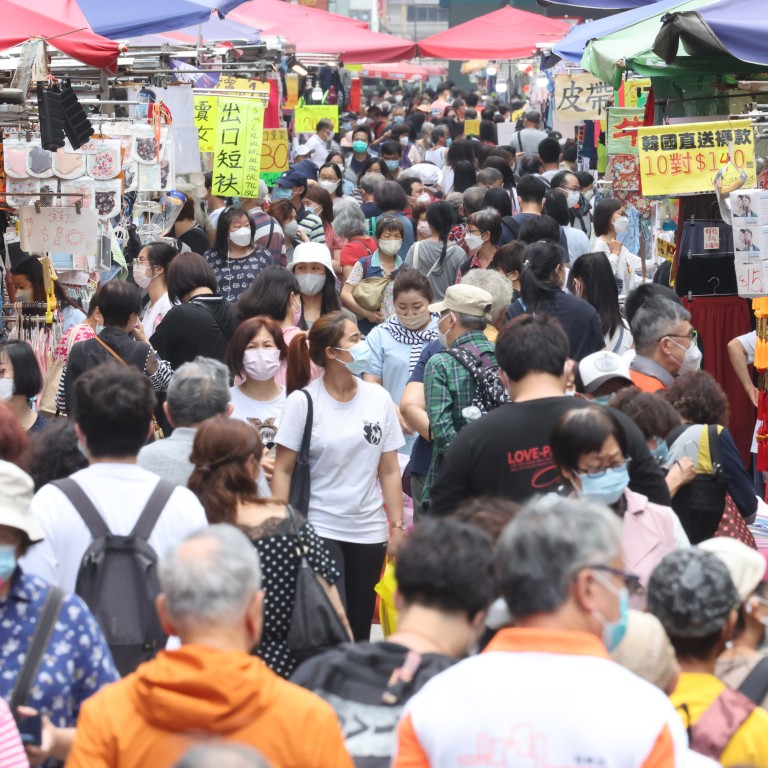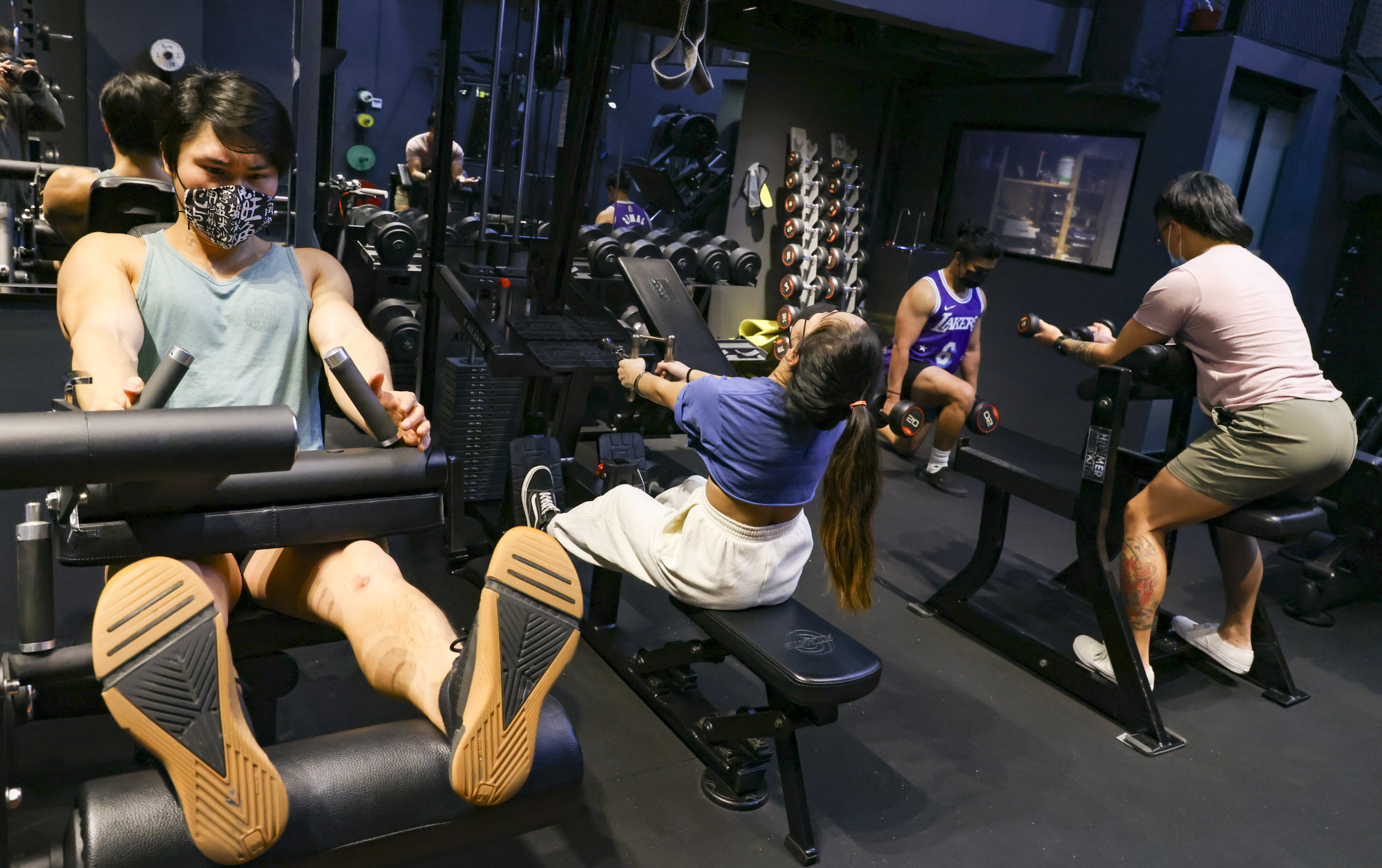
Coronavirus: Hong Kong on track to open beaches, nightlife districts and more next month, but city leader rules out bringing forward next round of social-distancing easing
- Carrie Lam says government will press on with relaxing social-distancing measures unless there is a sudden surge in Covid-19 cases, a prospect she sees as ‘unlikely’
- Chief executive says city is on path to resuming normal activities after being hit hard by the fifth wave of infections
Meeting the press on Tuesday for the first time since ending her regular briefings dedicated to the pandemic, Lam cited widespread immunity to the coronavirus among the population, a drop in infections found during overnight lockdowns of resident blocks and a declining percentage of cases detected through sewage testing as proof the city was on the path back to “normality”.
“It is gratifying to know that after more than three months since the fifth wave hit us hard in Hong Kong, we are on the path to return to normal activities,” she said.
Health authorities logged 347 cases on Tuesday, the fewest since February 6 when 342 infections were reported. Officials also reported seven more deaths related to the coronavirus, including a single backlogged one.
Limited flights, strict rules blamed for keeping foreigners away from Hong Kong
Under the first phase of a three-stage social-distancing easing that took effect last week, the government allowed restaurants to resume evening dine-in service and seat up to four people per table. Gyms, beauty parlours, cinemas, theme parks and places of worship were permitted to reopen, and sightseeing companies could begin taking groups out on tours, but tough screening and vaccination requirements were mandated for some businesses.
The government took the further step of announcing on Friday that foreigners could fly into the city starting May 1 and rules for suspending flights found to be carrying infected passengers would be eased.
In the second phase, all other types of premises and businesses under public health-control regulations can resume operation, including bars, swimming pools, bathhouses, party rooms, nightclubs, karaoke lounges, mahjong-tin kau venues and cruise ships. Bars were ordered shut and cruises to stop taking bookings on January 7, while public beaches were closed on March 17.
The cap on groups in restaurants and most other establishments will be raised to eight people, and the city’s 42 public beaches will also reopen. Masks will not be required during workouts at sports venues or gyms. No firm date has yet been given for the start of the second phase.

Lam said that she did not have any plans to further relax the flight suspension mechanism, despite calls from industry figures to scrap the rule and the one-week quarantine requirement for arrivals. She described the pandemic situation as “increasingly stable”, noting the daily number of infections were below 1,000 for two straight weeks.
The proportion of cases detected through sewage testing in the community had fallen from 0.73 per cent on April 15 to 0.23 per cent, Lam said. Infections detected at residential buildings placed under mandatory testing orders had also fallen from 0.61 per cent two weeks ago to 0.32 per cent, she noted.
Lam also acknowledged that much of the population was covered by “hyrbrid immunity”, the result of improving vaccination levels and a large number of residents being infected with the virus over the past three months. But inoculation levels among elderly, a persistent challenge throughout the fifth wave, needed to be raised, she stressed.
To cope with an expected increase in international travellers, nine isolation hotels for Covid-19 patients would be converted to quarantine use, providing an additional 3,000 rooms, starting from May, Lam revealed, noting the current occupancy rate of such properties hovered between 60 to 70 per cent.
Patients at the city’s seven makeshift community isolation centres would be grouped into two or three facilities to save manpower and the remaining sites put on standby to prepare for a possible sixth wave of infections, she added.
Lam provided no updates on whether Hong Kong would carry out universal testing, saying only the government was monitoring the situation.
Civil service chief admits to ‘gaps’ in Hong Kong’s pandemic work, vows review
Some health experts have said the city can afford to further relax social-distancing measures sooner than planned, as the pandemic has become stable. Professor Ivan Hung Fan-ngai, a top infectious disease expert, previously said curbs should be eased in two or three weeks, should the daily number of cases fall below 100 by then, as is expected. They have also urged the government to consider dropping the flight suspension mechanism entirely.
But Lam predicted the city would soon benefit from the relaxations already in place or announced.
“I believe that after the epidemic is under control, with the gradual relaxation of measures to prevent imported cases, Hong Kong International Airport will immediately return to its former bustle and will attract more flights and tourists to Hong Kong,” she said.

Elsewhere in the city, 11 students and two teachers were reported as infected, according to the Centre for Health Protection. Seven students who tested positive for the virus on Tuesday attended classes the day before, officials said, adding they would continue to monitor the situation and noting that no schools had been hit by outbreaks.
Separately, 18 students who tested positive for the coronavirus and 10 undergoing isolation sat for Diploma of Secondary Education (DSE) exams at the Penny’s Bay quarantine centre.
The government also published a list of 212 private doctors allowed to prescribe two Covid-19 oral drugs to patients. The private doctors must follow treatment guidelines set out by the Hospital Authority and should not charge patients any fees for the drugs.
The city’s overall Covid-19 tally since the pandemic began stood at 1,202,638 infections and 9,274 related fatalities.
Additional reporting by Gigi Choy



